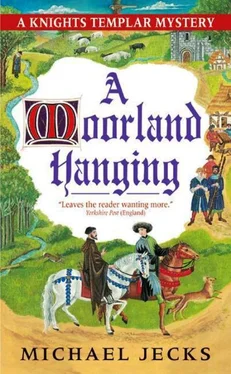“Because, my lady, Sir William here has committed three murders, and we have to produce evidence of this at the next court at Lydford. I am sorry, but there is nothing we can do about it.”
“But surely,” she said softly, “you do not want to ruin us? Will it profit the men who are dead? There is little proof that my husband has done anything wrong, after all.”
“Lady, he admits it!” said Simon hotly, but she held up her hand.
“No one has yet tried to accuse my husband of anything. We could easily forget this unpleasant affair. We are not so very wealthy, but we can offer land and money to our friends.”
Baldwin stared at her with his brows drawn. “You are suggesting an accommodation?” he said at last, and she nodded. “I see.” He turned to the miner and motioned him forward.
“In that case I should make my opinion plain,” said Thomas heavily. He pointed a shaking finger. “Sir William, I accuse you of the murder of Peter Bruther, of the murder of Samuel Hankyn, and of the murder of Ronald Taverner.”
“I think that says it all,” said Simon calmly. “Sir William, you are under attachment to come with us to Lydford. Lady, I hope that makes our view plain.”
She glared at him with soaring rage, and then opened her mouth to scream for the guards, but before she could speak, Robert put a hand to her shoulder. When she attempted to slap it away, he held her hand. While she stared at him in horror, he said, “Mother, be silent. The knight is right – Father is guilty by his own mouth. I’ll not have more honest men killed to protect the guilty. Sir Baldwin, you have my support.”
His father had a wild fear in his eyes. “Robert? What do you mean? You don’t expect me to go to the castle at Lydford, do you, because I’ll kill anyone who tries to take me there, and I don’t care who it is! The guards in this Manor are…”
“Mine, and when they hear that you are a murderer, who has confessed to killing two of their friends, condemned from your own mouth, they will obey my orders. Do you want me to have you bound to prove it?”
Sitting once more in the sun outside Simon’s house at Lydford, watching the villeins working the fields behind the village, Baldwin was relaxed and drowsy. It was a more or less satisfactory end to the enquiry, he felt. Sir William had been held by the court, an event which caused some initial disquiet to the burgesses of the village who would never have expected to keep a knight in the chilly and damp cell under the ground. But they had quickly become used to the idea, and now some relished the depths to which the knight had sunk – metaphorically and physically. Fighting between Beauscyr men and the miners had all but stopped. Now the only recorded fighting was the normal fisticuffs outside the inns and an occasional dispute on the moors about who had bounded a particular parcel of land for mining.
Hearing a shrill scream and the thunder of small feet in the screens behind him, Baldwin smiled and groaned, slowly rising to his feet. In a few moments Simon was with him, his daughter clinging to one arm. “Fetch your poor father some wine, Edith,” he said, carefully depositing her on the grass, and giggling, the eight year old ran back into the house. His eyes followed her slight form until she disappeared, then he slumped into his seat with a contented sigh, casting a baleful eye at his friend. “I trust there is a little wine left?”
For those readers unfamiliar with my two earlier novels featuring Sir Baldwin Furnshill and Simon Puttock, a quick guide to early fourteenth-century history may be useful.
The late 1200s and early 1300s were years of massive change for Europe’s population. Conflict over the papacy in Rome had led to the Pope moving his court to Avignon in France; thus the French King, Philip IV, became the most powerful man in Christendom, directly influencing God’s vicar on earth.
As proof of the French King’s new authority one need look no further than the “Poor Fellow-Soldiers of Christ and the Temple of Solomon” – the Templar Knights. They had been the leading institution in Europe for almost two hundred years, reporting only to the Pope himself. Considering themselves warriors for God, the monks fought for the defense of the Kingdom of Jerusalem, often recklessly throwing their lives away in battle, so strong was their faith in the Order’s mission to protect Christ’s country from invasion by pagans. These men were knights in their own right, but gave up secular pleasures and personal wealth in order to take the oaths of their monastic order: poverty, chastity and obedience.
The Templars flourished with the Crusades, earning vast sums from their ventures in banking and commerce; indeed they could be described as being the first retail bankers, issuing notes to confirm deposits which could then be redeemed in other countries. Massive estates were given to them by supporters, providing rich sources of income to help maintain their army. By the end of the 1200s the Templars were a force to be reckoned with.
However, Philip IV was in dire need of funds. In 1306 he moved against a rich but disliked and unprotected group. In one day, every Jew in France was arrested. All their records and assets were seized and auctioned to the benefit of the Crown. Meanwhile, Jewish citizens were thrown out of the kingdom with nothing. Conveniently, all notes confirming royal debts to the Jews were destroyed, though monies owed by subjects were now payable to the King – and he required prompt payment. All in all, this proved a thoroughly successful venture, and soon Philip began to cast around for other similarly wealthy groups to fleece.
The Templars were hardly an easy target, but they were certainly rich – although as a religious Order, they were protected by the Pope. How could the King gain access to their money while the Pope was nominally responsible for them?
Fortunately, Pope Clement V was a man with a thoroughly modern attitude. He was absolutely committed to his own wealth. Usefully, he was also close to hand, now that he lived in France. Still, even he would have balked at the idea of robbing the Templars, so the King moved without telling him.
The Templars’ fate was really sealed earlier, in 1291, when the last significant holding in Palestine was captured, because their whole reason for existence disappeared with it. Acre was the sole remaining possession of the old Crusader Kingdom of Jerusalem. It was attacked in April 1291, and on May 28 it fell under the massive Muslim onslaught. With it died the hopes of the whole of Christendom for the old Kingdom. Much of the respect for the Templars died at this time, too. Other Orders were similarly held in some disdain after the fall of Acre, but only the Templars had their headquarters in France, and this was their downfall.
On Friday, October 13, 1307 – a date which has given us the popular superstition – every member of the Order in France was arrested. Many wild conspiracy theories have been proposed about their destruction, but only one fact is absolute and inescapable: beforehand the Templars were wealthy; afterward their wealth disappeared. Philip was the prime mover in accusing them of various crimes, at a time when he sorely needed money. The Pope soon came round to agreeing to the charges pressed by the King. It seems likely that Clement V enjoyed some financial benefit from the Order’s destruction, and this helped him to believe the allegations.
The Order was disbanded. Some of the knights were already dead. Others, especially the more prominent, were burned publicly. Of the rest, many were allowed to disappear into monasteries, a few faded away and joined the Teutonic Knights or the Knights Hospitaller, or one of the other Orders fighting pagans at the fringes of Christianity.
Читать дальше












